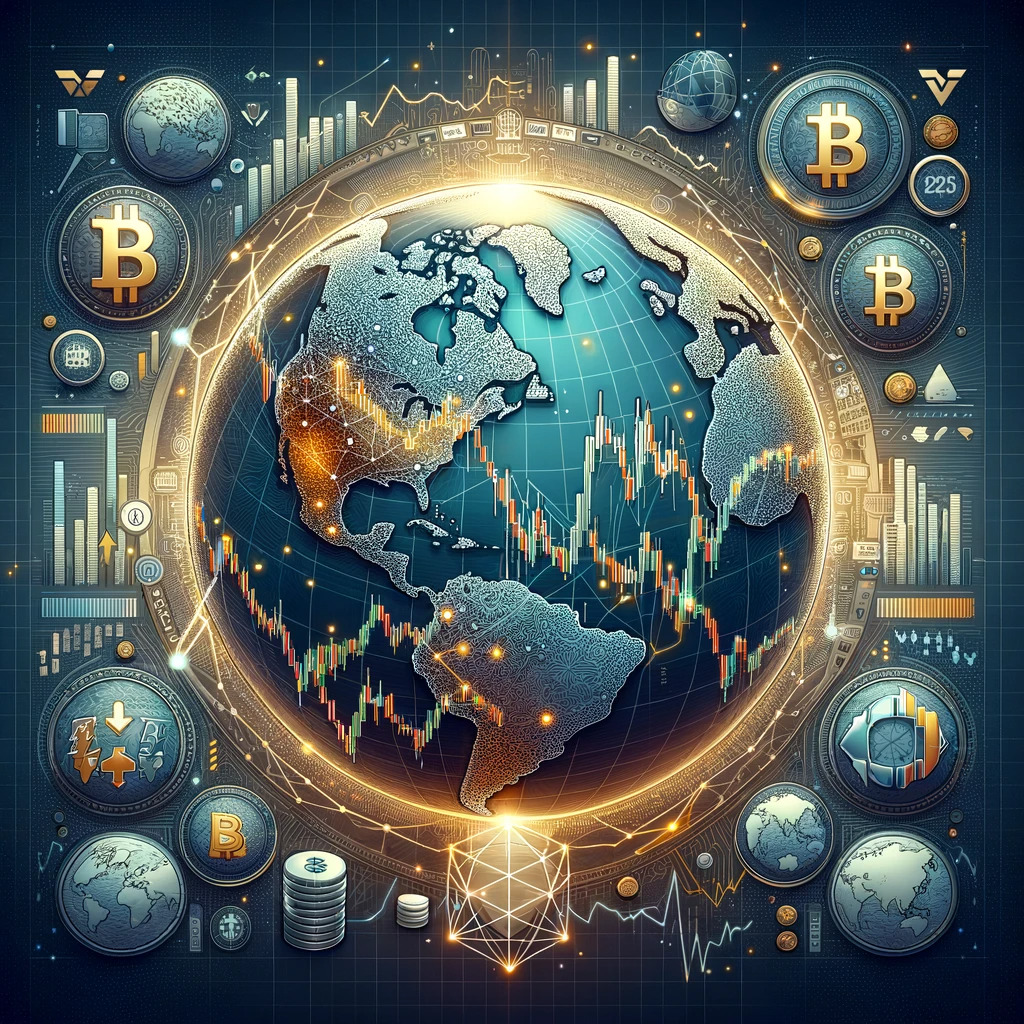
In today’s rapidly evolving geopolitical landscape, the intricate interplay between major world powers such as Russia, China, and the United States holds profound implications not just for international relations, but also for the global financial markets and the broader world economy. As we navigate through these turbulent times, understanding the potential for global conflict and its cascading effects on various economic sectors becomes paramount.
This comprehensive analysis delves into the current state of affairs, examining the tensions between Russia, China, and the USA, and unraveling their intricate impact on the crypto market, stock market, and the overall economic outlook as we look forward to 2024.
Through a meticulous examination of each country’s geopolitical stance, recent developments, and future prospects, we aim to provide a holistic view of the potential global conflicts and their implications on the world’s financial stability and economic prosperity.
1.1 Russia: Global Conflict Potential
Introduction to the Russia-Ukraine Conflict
Ukraine has been a significant player in the global security order, finding itself at the crossroads of a renewed great-power rivalry. The country’s westward drift since gaining independence has been countered by Russia, with the most recent and significant event being Russia’s invasion of Ukraine in February 2022. This marked a dramatic escalation in the eight-year-old conflict that began with Russia’s annexation of Crimea and has been a major turning point for European security.
Russia’s Invasion of Ukraine
The invasion of Ukraine by Russia was a major strategic move by President Vladimir Putin, which many analysts view as a significant blunder. The conflict has led to a potential for dangerous escalation, including the possible use of nuclear weapons by Russia. The war has also accelerated Ukraine’s efforts to join Western political blocs such as the European Union (EU) and the North Atlantic Treaty Organization (NATO).
Geopolitical Flashpoint: Ukraine
Ukraine has been a cornerstone of the former Soviet Union and has played a crucial role in the global security environment. The country has sought to align more closely with Western institutions while struggling to balance its foreign relations and bridge internal divisions. The annexation of Crimea by Russia in 2014 and the support for separatists in the Donbas region have led to a significant loss of life and marked a clear shift in the global security environment.
Russia’s Broad Interests in Ukraine
Russia has deep cultural, economic, and political ties with Ukraine, viewing the country as central to its identity and global standing. The familial bonds, the presence of a significant ethnic Russian population in Ukraine, and the desire to maintain political influence and trade relationships have been key drivers of Russia’s actions in Ukraine.
The 2022 Full-Scale Invasion
The full-scale invasion of Ukraine by Russia in 2022 can be seen as a culmination of longstanding tensions and geopolitical rivalry. The invasion aimed to topple the Western-aligned government of Volodymyr Zelenskyy and has led to significant loss of life, displacement of people, and widespread destruction.
U.S. and EU Policy in Ukraine
The United States and the European Union have been committed to supporting Ukraine and imposing sanctions on Russia in response to its aggressive actions. The provision of military aid, economic assistance, and the imposition of sanctions have been key components of the Western response to the conflict.
1.2 China: Global Conflict Potential
China’s rise as a global superpower has been one of the most significant geopolitical developments of the 21st century. Its rapid economic growth, expanding military capabilities, and increasing influence in international affairs have shifted the global balance of power and introduced new dynamics in international relations, particularly with the United States and Russia.
Economic Ascendancy and Global Influence
China’s economic ascendancy has been accompanied by a strategic expansion of its global influence. The Belt and Road Initiative, a massive infrastructure project spanning across continents, exemplifies China’s ambitions to strengthen its economic ties and increase its presence on the world stage. This has led to concerns among Western powers about China’s long-term intentions and its commitment to the existing international order.
Sino-American Relations: A Complex Web
The relationship between China and the United States is multifaceted and complex, characterized by a mix of economic interdependence, strategic rivalry, and mutual distrust. Trade tensions have escalated in recent years, marked by tariff wars and disputes over technology and intellectual property. The U.S. has expressed concerns over China’s military modernization, its actions in the South China Sea, and its approach to Taiwan, which it considers a renegade province.
China-Russia Relations: A Strategic Partnership
China’s relationship with Russia has been strengthening, driven by a shared interest in countering U.S. influence and mutual benefits in energy and defense cooperation. The two countries have conducted joint military exercises and have supported each other on various international issues. However, this partnership is not without its complexities, as historical mistrust and regional competition also play a role.
The Impact on Global Security
China’s rise and its strategic partnerships and rivalries have significant implications for global security. The potential for conflict in the Taiwan Strait, the South China Sea, and along China’s border with India are flashpoints that could have far-reaching consequences. Additionally, China’s approach to issues such as cyber security, space, and emerging technologies adds another layer of complexity to the global security landscape.
Looking Ahead: Challenges and Opportunities
As we look forward to 2024, the trajectory of China’s rise and its impact on global affairs remain uncertain. The country faces internal challenges, including demographic shifts, environmental issues, and the need for economic reform. How China navigates these challenges, manages its relationships with major powers, and asserts itself on the global stage will be crucial in shaping the future of international relations and global stability.
1.3 USA: Global Conflict Potential
The United States, as the world’s preeminent superpower, plays a pivotal role in shaping the global order and maintaining international stability. Its policies and actions have far-reaching implications, particularly in the context of its complex relationships with Russia and China.
The U.S. and Russia: A Fraught Relationship
The relationship between the United States and Russia has been marked by periods of tension and rivalry, interspersed with attempts at cooperation. The post-Cold War era saw a reset in relations, but recent years have witnessed a return to a more adversarial stance. Issues such as cyber warfare, election interference, and conflicts in Syria and Ukraine have strained the relationship, leading to mutual distrust and the imposition of sanctions.
Navigating Sino-American Tensions
The U.S.-China relationship is one of the most consequential bilateral relationships in the world, characterized by a complex mix of competition and cooperation. Economic interdependence coexists with strategic rivalry, particularly in the realms of technology, trade, and military power. The U.S. has sought to address issues related to trade imbalances, intellectual property theft, and human rights, while also engaging with China on global challenges such as climate change and public health.
The U.S. Role in Global Security
The United States continues to play a central role in maintaining global security through its network of alliances, military presence, and diplomatic efforts. Its commitments to NATO, its strategic partnerships in Asia, and its role in international institutions underscore its influence in shaping the global order. However, debates over burden-sharing, the rise of isolationist sentiments, and challenges to the liberal international order pose questions about the future of U.S. leadership on the world stage.
Domestic Challenges and Foreign Policy
The United States faces a range of domestic challenges, from political polarization and social divisions to economic inequality and public health crises. How these issues are addressed will have implications for U.S. foreign policy and its ability to project power and influence globally. The country’s commitment to democratic values, human rights, and the rule of law remains a cornerstone of its foreign policy, even as it navigates a complex and evolving international landscape.

Looking Forward to 2024
As we approach 2024, the United States stands at a crossroads, with decisions made today shaping its role in the world for years to come. Balancing its relationships with Russia and China, addressing global challenges, and navigating domestic issues will be crucial in determining the trajectory of U.S. influence and the stability of the international system.
Impact on Crypto Market

The intricate geopolitical landscape involving the United States, Russia, and China has profound implications for the crypto market. This decentralized and relatively nascent market is highly sensitive to global events, regulatory changes, and shifts in investor sentiment.
2.1 Geopolitical Tensions and Crypto Volatility
The crypto market is known for its volatility, and geopolitical tensions can exacerbate price fluctuations. Investors often turn to cryptocurrencies as a hedge against traditional financial markets during times of uncertainty. However, the market can also be adversely affected by negative news, regulatory crackdowns, or security concerns related to geopolitical conflicts.
2.2 Regulatory Landscape
The regulatory environment for cryptocurrencies is still evolving, and the stance of major powers like the U.S., China, and Russia plays a significant role in shaping global regulations. The U.S. has been working towards establishing clearer regulatory frameworks, while China has taken a more restrictive approach, banning crypto trading and mining activities. Russia’s stance has been somewhat ambivalent, with discussions around potential regulations and the role of crypto in the economy ongoing.
2.3 Adoption and Integration
Despite the challenges, the adoption of cryptocurrencies and blockchain technology continues to grow. Countries facing economic sanctions, such as Russia, may explore cryptocurrencies as a means to circumvent restrictions and access international markets. On the other hand, China is pioneering the development of a central bank digital currency (CBDC), which could set the stage for broader adoption of digital currencies in the global economy.
2.4 Security Concerns
The decentralized nature of cryptocurrencies makes them a potential tool for illicit activities, including money laundering and financing terrorism. Geopolitical conflicts can heighten these concerns, with states potentially using cryptocurrencies to evade sanctions or conduct cyber warfare. Ensuring the security and integrity of crypto transactions is paramount, especially in the context of global tensions.
2.5 Investor Behavior and Market Sentiment
Investor behavior in the crypto market is heavily influenced by market sentiment, which can be swayed by geopolitical events. Positive developments in international relations can boost confidence, while tensions and conflicts can lead to market sell-offs. Understanding the nuances of investor behavior in response to global events is crucial for navigating the crypto market.
Impact on Stock Market and World Economy
The escalating tensions and complex interplay between Russia, China, and the USA have far-reaching implications, not just confined to the crypto market, but also significantly impacting the stock market and the broader world economy. Understanding these impacts is crucial for anticipating future trends and making informed decisions.
3.1 Stock Market Volatility
Geopolitical tensions often lead to increased volatility in global stock markets. Investors tend to react to uncertainties and potential threats by moving their capital to safer assets, leading to fluctuations in stock prices. The stock markets in the USA, Russia, and China are all susceptible to these shifts, with global investors closely monitoring the situation to adjust their portfolios accordingly.
3.2 Trade Relations and Economic Sanctions
The USA, China, and Russia are major players in international trade, and their relationships significantly influence global trade dynamics. Trade wars, such as the one between the USA and China, can lead to tariffs and other trade barriers, impacting businesses and consumers worldwide. Additionally, economic sanctions imposed by the USA and its allies on Russia, particularly in response to the conflict in Ukraine, have further strained international trade and economic relations.
3.3 Energy Markets and Global Supply Chains
Russia is a major global energy supplier, and disruptions in Russian energy exports due to geopolitical tensions or sanctions can have ripple effects across global energy markets. This, in turn, can lead to fluctuations in energy prices, impacting industries and consumers worldwide. Furthermore, the interconnectedness of global supply chains means that tensions between major economies can lead to disruptions, affecting manufacturing, distribution, and ultimately, the global economy.
3.4 Currency Markets and Capital Flows
Geopolitical conflicts can lead to shifts in currency markets, affecting exchange rates and capital flows. The Russian Ruble, Chinese Yuan, and US Dollar all play significant roles in international finance, and their values are influenced by domestic and international events. Capital flight from emerging markets to safer assets in developed countries is a common occurrence during times of geopolitical uncertainty.
3.5 Long-Term Economic Impacts
The long-term economic impacts of geopolitical tensions are complex and multifaceted. On one hand, increased military spending and investments in security can stimulate certain sectors of the economy. On the other hand, prolonged conflicts and uncertainties can hinder economic growth, deter investment, and lead to a reallocation of resources away from productive activities.
3.6 The Road to 2024: Anticipating Changes
Looking forward to 2024, the trajectory of the world economy will be significantly influenced by the resolution or escalation of tensions between the USA, China, and Russia. Efforts to diversify supply chains, invest in renewable energy, and promote international cooperation could mitigate some of the negative impacts, while failure to address underlying issues could lead to prolonged instability and economic challenges.
Looking Forward to 2024

As we cast our gaze forward to 2024, the interplay between geopolitical tensions, market dynamics, and the world economy presents a complex and uncertain future. In this section, we will explore potential scenarios and provide a forecast based on current trends and developments.
4.1 Geopolitical Landscape
The future of global relations, particularly between the USA, China, and Russia, will be a defining factor in shaping the world in 2024. If current tensions escalate, we could see an increase in military conflicts, cyber warfare, and economic sanctions, leading to heightened global instability. Conversely, diplomatic efforts and conflict resolution could pave the way for a more stable and cooperative international environment.
4.2 Crypto Market Evolution
The crypto market is poised for continued growth and maturation, with potential for increased adoption, innovation, and regulatory clarity. However, its trajectory will be heavily influenced by geopolitical events and regulatory developments. A stable and cooperative global environment could foster innovation and adoption, while tensions and regulatory crackdowns could hinder progress and increase volatility.
4.3 Stock Market and Economic Outlook
The stock market and world economy are likely to experience continued fluctuations in response to geopolitical developments, technological advancements, and shifts in consumer behavior. A positive scenario would see a recovery from any economic downturns, stability in stock markets, and progress towards addressing global challenges such as climate change and inequality. On the other hand, prolonged tensions and economic instability could lead to recessions, market crashes, and increased global disparities.
4.4 Technological Advancements and Innovation
Technological advancements, particularly in areas such as artificial intelligence, renewable energy, and biotechnology, have the potential to transform economies and societies. Geopolitical stability and international cooperation will be crucial in fostering innovation, addressing ethical concerns, and ensuring the equitable distribution of benefits.
4.5 Environmental Considerations and Sustainability
The impact of climate change and the need for sustainable development will continue to be pressing issues in 2024. Geopolitical cooperation will be essential in addressing environmental challenges, transitioning to renewable energy sources, and promoting sustainable practices across industries and communities.
4.6 Social and Political Dynamics
The social and political dynamics within and between countries will play a significant role in shaping the future. Efforts to promote democracy, human rights, and social justice will contribute to stability and prosperity, while neglecting these areas could lead to social unrest, political instability, and increased global tensions.
In summary, the road to 2024 is fraught with uncertainties and potential turning points. The actions taken by major powers, the evolution of global markets, and the collective efforts to address pressing challenges will determine the state of the world in 2024. Navigating these complexities will require foresight, resilience, and a commitment to international cooperation and sustainable development.
Conclusion: Navigating a Complex Future
As we navigate through the intricate web of geopolitical tensions, market dynamics, and global economic challenges, the path forward is fraught with uncertainty and complexity. The interactions between major world powers, particularly the USA, China, and Russia, will play a pivotal role in shaping the future, influencing everything from the stability of global markets to the security and prosperity of nations worldwide.
The crypto market, with its inherent volatility and sensitivity to global events, stands at the forefront of these changes. Its evolution will be closely tied to regulatory developments, technological advancements, and shifts in investor sentiment, all of which are influenced by the broader geopolitical landscape.
The stock market and the world economy are not immune to these forces. They too will feel the ripple effects of international relations, trade policies, and economic sanctions. The resilience of global supply chains, the stability of currency markets, and the health of national economies will all be tested in the coming years.
Looking forward to 2024, the potential scenarios are varied. A world marked by cooperation, innovation, and stability could lead to prosperity, growth, and advancements in technology and sustainability. Conversely, a path of conflict, instability, and retrenchment could result in economic downturns, market volatility, and global challenges left unaddressed.
In the face of these uncertainties, the need for informed, strategic, and proactive approaches has never been greater. Stakeholders across sectors and borders must come together to navigate these turbulent waters, seeking common ground and collaborative solutions to the challenges that lie ahead.
The future may be uncertain, but the actions taken today will shape the world of tomorrow. By understanding the interconnectedness of global events, markets, and economies, and by working together towards common goals, we can strive to create a more stable, prosperous, and sustainable future for all.
Ainu Token aims to offer impartial and trustworthy information on cryptocurrency, finance, trading, and shares. However, we don't provide financial advice and recommend users to conduct their own studies and thorough checks.


